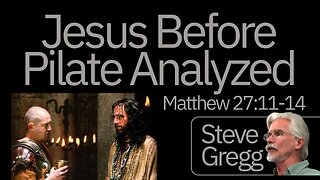Premium Only Content

Jesus is Willingly Arrested (Matthew 26:47-56) - Steve Gregg
https://thenarrowpath.com | In Steve Gregg’s lecture on Matthew 26:47–56, he explores the betrayal and arrest of Jesus in the Garden of Gethsemane, focusing on Judas’ deceitful kiss, Peter’s violent reaction, and Jesus’ nonviolent response. Gregg highlights Judas’ treachery in identifying Jesus with a kiss, a gesture of false friendship, and examines Peter’s impulsive act of cutting off Malchus’ ear, noting variations in Gospel accounts and the likely protection of Peter’s identity in earlier Gospels. Jesus rebukes Peter’s violence, stating that those who live by the sword risk dying by it, and emphasizes his ability to call upon divine protection (twelve legions of angels) but chooses to fulfill Scripture through submission to arrest. Jesus’ healing of Malchus and acceptance of his “cup” of suffering reflect his teachings on nonresistance and trust in God’s will, challenging modern Christians to prioritize divine protection over self-defense, as exemplified by early Christian martyrs like the Anabaptists and Polycarp. Transcript: https://opentheo.org/i/765611936653040106/matthew-2647-2656
Lecture Outline: Matthew 26:47–56
• Context of the Passage
– Jesus is in the Garden of Gethsemane, having prayed three times while
the disciples slept.
– The passage (Matthew 26:47–56) describes Judas Iscariot’s betrayal and
Jesus’ arrest.
• Judas’ Betrayal
– Judas betrays Jesus with a kiss, a deceitful act despite being a common
Middle Eastern greeting.
– Jesus calls Judas “Friend” (Matthew 26:50), showing goodwill despite
Judas’ treachery.
– In Luke 22:48, Jesus questions Judas: “Are you betraying the Son of
Man with a kiss?” to highlight the betrayal’s gravity.
– The kiss was a prearranged signal to identify Jesus, possibly due to
poor lighting or unfamiliarity of the soldiers with Jesus’ appearance.
– Judas’ motives are unclear; some view him as always wicked, others
as a disillusioned follower.
• Peter’s Reaction
– One disciple (identified as Peter in John 18:10) draws a sword and cuts
off the ear of Malchus, the high priest’s servant.
– Matthew, Mark, and Luke omit Peter’s name, possibly to protect him
from legal consequences while he was alive.
– John, written later (likely after Peter’s death), names both Peter and
Malchus, indicating eyewitness detail.
• Jesus’ Response to Peter
– Jesus rebukes Peter, saying, “For all who take the sword will perish by
the sword” (Matthew 26:52).
– Possible interpretations of this statement:
* Specific to the situation: The disciples were outnumbered, and violence
would lead to their death.
* General principle: Using violence invites violent retaliation, escalating
conflict.
* Prophetic: Those attacking Jesus (with swords) would later face
judgment (e.g., Roman destruction of Jerusalem in 70 AD).
– Jesus emphasizes he could call “more than twelve legions of angels”
(72,000) for protection if needed, but chooses not to, to fulfill Scripture
(Matthew 26:53–54).
– In Luke 22:51, Jesus says, “Permit even this,” and heals Malchus’ ear,
demonstrating grace toward an enemy.
– In John 18:11, Jesus tells Peter to sheath his sword, accepting the “cup”
(his arrest and crucifixion) as God’s will.
• Jesus’ Interaction with the Crowd
– Jesus questions the crowd: “Have you come out as against a robber
with swords and clubs to take me?” (Matthew 26:55), noting he taught
openly in the temple without resistance.
– He affirms that his arrest fulfills the Scriptures of the prophets (Matthew
26:56).
• Disciples’ Response
– All disciples abandon Jesus and flee (Matthew 26:56), highlighting their
fear and human frailty.
• Theological Implications
– Jesus’ nonviolent response reflects his teaching to do good to enemies,
exemplified by healing Malchus.
– Comparison to early Christians (e.g., Anabaptists, Polycarp) who embraced nonresistance and martyrdom.
– Jesus’ acceptance of the “cup” reflects submission to God’s will, even
in suffering.
– Challenges modern Christians’ reliance on self-defense and weapons,
emphasizing trust in God’s protection (e.g., “safety is from the Lord”).
• Conclusion
– The passage underscores Jesus’ commitment to fulfilling God’s plan
through nonviolence and submission.
– Encourages reflection on trust in God’s provision over human efforts
at self-defense.
#jesus #jesuschrist #arrest #gospel #gospelofmatthew #matthew26
#bibleteaching #biblestudy #sacrifice #thenarrowpath #stevegregg #miracle
-
 22:27
22:27
The Narrow Path
1 month agoJesus Before Pontius Pilate Analyzed by Steve Gregg (Matthew 27:11-14)
721 -
 1:26:12
1:26:12
Steven Crowder
13 hours agoThe Left is Violent (Part 2) | Change My Mind
471K781 -
 LIVE
LIVE
Man in America
6 hours agoDollar Collapse is Engineered to Herd Us Into CBDC Prison—David Jensen EXPOSES the Playbook
556 watching -
 5:16:01
5:16:01
MattMorseTV
5 hours ago $5.03 earned🔴CHILLING + TALKING🔴
60.2K3 -
 2:04:23
2:04:23
The Charlie Kirk Show
2 hours agoTHOUGHTCRIME Ep. 99 — THOUGHTCRIME IRL
54.1K20 -
 LIVE
LIVE
Flyover Conservatives
10 hours agoSilver Shortage ALERT: London Vaults Running Dry in 4 Months- Dr. Kirk Elliott; 3 Tips to Transform Your Business - Clay Clark | FOC Show
464 watching -
 1:10:18
1:10:18
Glenn Greenwald
4 hours agoIsrael Pays Influencers $7,000 Per Post in Desperate Propaganda Push: With Journalist Nick Cleveland-Stout; How to "Drink Your Way Sober" With Author Katie Herzog | SYSTEM UPDATE #525
71.2K70 -
 38:54
38:54
Donald Trump Jr.
8 hours agoDems' Meme Meltdown, Plus why California Fire Victims should be more Outraged than Ever | TRIGGERED Ep.279
95.2K81 -
 LIVE
LIVE
megimu32
1 hour agoOn The Subject: Meg’s Birthday Bash! 🎂🎶
155 watching -
 23:47
23:47
Jasmin Laine
6 hours agoALL HELL BREAKS LOOSE—Eby MELTS DOWN While Poilievre CORNERS Carney
5.01K11
